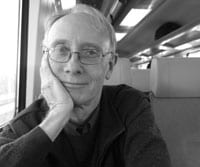Friday April 25, 2014
“Documentary Filmmaking as Process: In Honor of James Blue”
 David MacDougall is an adjunct professor at the Australian National University Research School of Humanities and the Arts. He is an ethnographic filmmaker and writer on visual anthropology and documentary cinema who attended Harvard University and the University of California at Los Angeles. His films have won various awards and prizes and he is currently working on a continuing long-term, comparative research project on institutions for children in India. His research interests include theoretical and practical aspects of visual anthropology, vernacular photography, the anthropology of childhood, children’s institutions in India, pastoral societies, indigenous media, the aesthetic systems of communities and everyday life.
David MacDougall is an adjunct professor at the Australian National University Research School of Humanities and the Arts. He is an ethnographic filmmaker and writer on visual anthropology and documentary cinema who attended Harvard University and the University of California at Los Angeles. His films have won various awards and prizes and he is currently working on a continuing long-term, comparative research project on institutions for children in India. His research interests include theoretical and practical aspects of visual anthropology, vernacular photography, the anthropology of childhood, children’s institutions in India, pastoral societies, indigenous media, the aesthetic systems of communities and everyday life.
Saturday, April 26, 2014
“Honest Truths: Why Human Rights Principles Should Guide Documentary Filmmaking”
 Kelly Matheson, Senior Program Manager, WITNESS, is an attorney, filmmaker and human rights advocate who previously worked with WITNESS to launch the first Video Advocacy Institute. As an attorney, she worked as a Law Fellow in Tanzania researching citizens’ rights to bring suit against their governments when governments broke their own laws. She also practiced throughout the western United States, working on issues where environmental and human rights converge. She began creating films in 2003 as part of Montana State University’s MFA Documentary Filmmaking program. Her film projects focus on indigenous and environmental rights in Central America, the United States and the Congo Basin. Kelly returned to WITNESS after working as a Fulbright researcher in Congo-Brazzaville, where she collaborated with a video-centered outreach project to determine the effectiveness of video to change health and conservation practices.
Kelly Matheson, Senior Program Manager, WITNESS, is an attorney, filmmaker and human rights advocate who previously worked with WITNESS to launch the first Video Advocacy Institute. As an attorney, she worked as a Law Fellow in Tanzania researching citizens’ rights to bring suit against their governments when governments broke their own laws. She also practiced throughout the western United States, working on issues where environmental and human rights converge. She began creating films in 2003 as part of Montana State University’s MFA Documentary Filmmaking program. Her film projects focus on indigenous and environmental rights in Central America, the United States and the Congo Basin. Kelly returned to WITNESS after working as a Fulbright researcher in Congo-Brazzaville, where she collaborated with a video-centered outreach project to determine the effectiveness of video to change health and conservation practices.
